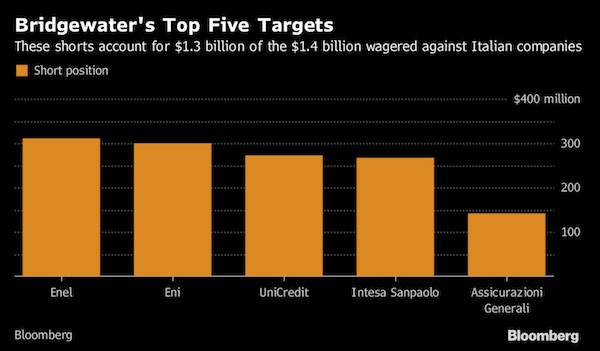
Salvator Rosa Heroic battle 1652
A point BOE Governor Mark Carney made recently may be the biggest cog in the European Union’s wheel (or is it second biggest? Read on). That is, derivatives clearing. It’s one of the few areas where Brussels stands to lose much more than London, but it’s a big one. And Carney puts a giant question mark behind the EU’s preparedness.
Carney Reveals Europe’s Potential Achilles Heel in Brexit Talks
Carney explained why Europe’s financial sector is more at risk than the UK from a “hard” or “no-deal” Brexit. [..] When asked does the European Council “get it” in terms of potential shocks to financial stability, Carney diplomatically commented that “a learning process is underway.” Having sounded alarm bells about clearing in his last Mansion House speech, he noted “These costs of fragmenting clearing, particularly clearing of interest rate swaps, would be born principally by the European real economy and they are considerable.”
Calling into question the continuity of tens of thousands of derivative contracts , he stated that it was “pretty clear they will no longer be valid”, that this “could only be solved by both sides” and has been “underappreciated” by Europe . Carney had a snipe at Europe for its lack of preparation “We are prepared as we should be for the possibility of a hard exit without any transition…there has been much less of that done in the European Union.”
In Carneys view “It’s in the interest of the EU 27 to have a transition agreement. Also, in my judgement given the scale of the issues as they affect the EU 27, that there will ultimately be a transition agreement. There is a very limited amount of time between now and the end of March 2019 to transition large, complex institutions and activities…
If one thinks about the implementation of Basel III, we are alone in the current members of the EU in having extensive experience of managing the transition for individual firms of various derivative and risk activities from one jurisdiction back into the UK. That tends to take 2-4 years. Depending on the agreement, we are talking about a substantial amount of activity.” [..] “I wouldn’t want to use financial stability issues as leverage. I wouldn’t want them to be addressed in a bloodless technocratic way in the interests of all the citizens.”
Sounds like Carney knows a thing or two that Juncker et al haven’t sufficiently thought through. The EU plans to move all – or most- derivatives clearing to the continent, but such a thing is anything but easy. That’s another very tangled web, and an expensive one to boot. Brussels probably wants to use the issue to put pressure on London in some way, but a hard Brexit might make that unlikely if not worse. Bloomberg from June this year:
EU Targets Derivative-Clearing Giants With Relocation Threat
“Today, a significant amount of financial instruments denominated in the currencies of the member states are cleared by recognized third-country CCPs,” according to the proposal. “For example, the notional amount outstanding at Chicago Mercantile Exchange in the U.S. is €1.8 trillion for euro-denominated interest-rate derivatives,” the commission said. “This also raises a series of concerns.”
The financial industry has lobbied hard against a location policy. The International Swaps and Derivatives Association said requiring euro-denominated interest-rate derivatives to be cleared by an EU-based clearinghouse would boost initial margin requirements by as much as 20% . The FIA, a trade organization for the futures, options and centrally cleared derivatives markets, has said forced relocation “could nearly double margin requirements from $83 billion to $160 billion.”
According to that Bloomberg piece, the notional amount outstanding of euro-denominated OTC interest-rate derivatives is some $90 trillion, 97% of which goes through the London Clearing House (LCH) based in .. well, you guessed it. Wikipedia:
LCH is a European-based independent clearing house that serves major international exchanges, as well as a range of OTC markets. Based on 2012 figures LCH cleared approximately 50% of the global interest rate swap market, and is the second largest clearer of bonds and repos in the world , providing services across 13 government debt markets.
In addition, LCH clears a broad range of asset classes including: commodities, securities, exchange traded derivatives, credit default swaps, energy contracts, freight derivatives, interest rate swaps, foreign exchange and Euro and Sterling denominated bonds and repos. LCH’s members comprise a large number of the major financial groups including almost all of the major investment banks, broker dealers and international commodity houses.
More details from Reuters, also in June:
Derivatives Body Warns EU Against Moving Euro Clearing From London
Shifting clearing of euro-denominated derivatives from London to the European continent would require banks to set aside far more cash to insure trades against defaults, a cost that would be passed on to companies, a global derivatives industry body says. [..]The London Stock Exchange’s subsidiary LCH currently clears the bulk of euro-denominated swaps, a derivative contract that helps companies guard against unexpected moves in interest rates or currencies.
Britain, however, is due to leave the bloc in 2019, putting it out of the EU’s regulatory reach. The International Swaps and Derivatives Association (ISDA), one of the world’s top derivatives industry bodies, said on Monday that a “relocation” in euro clearing to continental Europe would split liquidity in markets and reduce the ability of banks to save on margin by offsetting positions in the same liquidity pool.
Deutsche Bank has the world’s largest derivatives portfolio. Not all of it will be euro-denominated, but still. And I know it’s just notional amounts, but derivatives are not things one plays fast and loose with, lest the clearing becomes opaque and trouble starts.
Juncker better solve this thing. Oh, and this one too (yes, it’s quite fun to report on this):
Money Will Divide Europe After Brexit
As part of the transition period of around two years that she called for in her emollient Florence speech last month, Britain would continue to pay in to the EU budget to ensure that none of the member states was out of pocket owing to the decision to leave. These net payments of around €10 billion a year would fix the immediate problem facing the EU, the hole that would otherwise open up in its finances during the final two years of its current budgetary framework, which runs from 2014 to 2020.
[..] through its accounting procedures, the EU can and does commit it to spending that will be paid for by future receipts from the member states. What this means is that even after 2020 there will still be payments due on commitments made under the current seven-year spending plan. That pile of unpaid bills, eloquently called the “reste à liquider” (the amount yet to be settled), is forecast to be €254 billion at the end of 2020.
Estimates of what Britain might owe towards this vary, but taking into account what might have been spent on British projects it could be around €20 billion. On top of that – and the second main reason why the EU is holding out for more – the EU has liabilities, notably arising from the unfunded retirement benefits of European staff estimated at €67 billion at the end of 2016, which it is expecting Britain to share. Even taking into account some potential offsets from its share of assets, Britain may face a bill of between €30 billion and €40 billion on top of the €20 billion paid during the transition period.
The EU finances itself on the fly. It’ll have a €254 pile of unpaid bills in 3 years time. That is scary. Not for Brussels, but for its member countries. A hard Brexit, in which Britain may refuse to pay, is perhaps even scarier.
Anyway, once Juncker’s done with all that, he’ll have to move on to the next problem. Derivatives is a big cloud hanging over Europe, but this one is potentially shattering.
Ray Dalio, manager of the world’s biggest hedge fund, is shorting, placing large bets against, anything Italian, and given Italy’s size and hence importance to the EU, his bets are effectively bets against Brussels.
Dalio’s Fund Opens $300 Million Bet Against Italian Energy Firm
Bridgewater Associates is adding to its billion-dollar short against the Italian economy. The world’s largest hedge fund disclosed a $300 million bet against Eni SpA, Italy’s oil and gas giant, data compiled by Bloomberg show. Bloomberg previously reported that Ray Dalio’s firm had wagered more than $1.1 billion against shares of six Italian financial institutions and two other companies.
This latest bet is the hedge fund’s second-largest against an Italian company, trailing only the $310 million against Enel SpA, the country’s largest utility. Eni’s majority holder is the Italian government via state lender Cassa Depositi e Prestiti SpA and the Ministry of Economy. The public involvement also is reflected in the government’s role in appointing the chief executive officer. Current CEO Claudio Descalzi has been at the helm since 2014 and was reconfirmed this year.
$1.1 billion against the banking system, $310 million against the main utility, $140 million vs pan-European insurer Generali and now $300 million vs the national oil and gas company, That adds up to quite a bit more than the Bloomberg graph says, but I’ll include it anyway.

Dalio doesn’t call the bluff of Italy, and this is not just like George Soros’ shorting the British pound in 1992, he’s calling out the entire EU and its financial system. He’s saying I don’t believe you can keep up the charade. He’s making a mockery of Mario Draghi’s “whatever it takes”.
So what are Rome, Brussels and Frankfurt going to do? They can’t ignore the no. 1 hedge fund forever. They will have to pump money into Italy, in large amounts. Merkel won’t like that, neither will her new coalition partner FDP, and the Bundesbank may start legal action.
Dalio’s located the Union’s achilles heel, which is not just that Italy’s insolvent (it’s not alone in that), but that there’s a gigantic theater production being performed to give everyone the impression that things are going just swimmingly, thank you. So Dalio’s said: how much for a ticket to the show?, and paid it. And now he’s inside.
Bridgewater didn’t enter that theater for nothing. $1.85 billion is not chump change for them. Intesa Sanpaolo CEO Carlo Messina may have said that Dalio will lose his bets, but according to the IMF Italy’s non-performing loans levels were €356 billion at the end of June 2016, which is 18% of total loans for Italian banks, 20% of Italy’s GDP and one-third of total Eurozone NPLs. Intesa Sanpaolo holds a nice chunk of that.
‘Whatever it takes’ may well be too much to take for the EU, and Draghi looks outsmarted, as do Juncker and Merkel. How many billions will it take for Dalio to go away? And then, who’s next, which hedge fund, which politician, which ECB chief? Coming soon to a theater near you.








